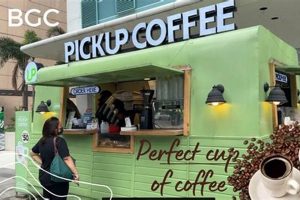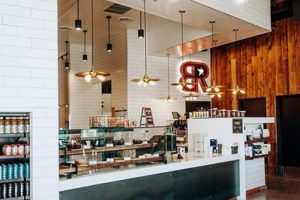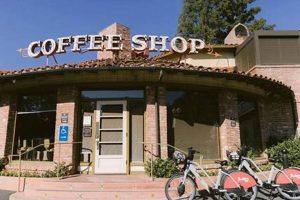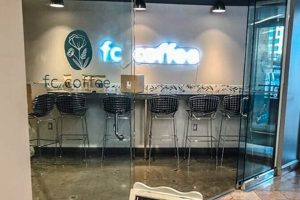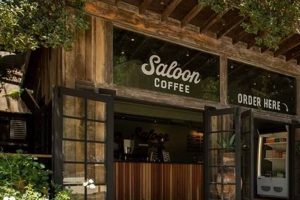A business model centered around providing coffee and related beverages from a vehicle or trailer designed for transport. This type of establishment can range from simple carts offering a limited menu to fully equipped vans featuring espresso machines and a wide variety of drink options. For example, a converted van parked at a farmers market dispensing lattes and pastries exemplifies such a venture.
This method of coffee distribution presents several advantages, including lower overhead costs compared to brick-and-mortar locations and the flexibility to operate at various events and locations. Historically, these businesses have filled a niche by providing access to specialty coffee in areas lacking traditional coffee shops or during peak demand times. The adaptability of these operations allows them to capitalize on opportunities and cater to a diverse customer base.
The subsequent sections will delve into the operational aspects, financial considerations, and marketing strategies relevant to launching and maintaining a successful on-wheels beverage business. Furthermore, regulatory compliance and equipment selection will be examined to provide a complete understanding of the mobile coffee industry.
Essential Considerations for Mobile Coffee Businesses
The following insights offer crucial guidance for establishing and managing a successful mobile coffee venture, focusing on key operational and strategic areas.
Tip 1: Secure Optimal Location Permits: Acquire all necessary permits and licenses from local authorities to ensure legal operation at chosen locations. Investigate zoning regulations and health department requirements before commencing business. Failure to comply can lead to fines or operational shutdowns.
Tip 2: Invest in Reliable Equipment: Purchase high-quality, durable espresso machines, grinders, and refrigeration units to withstand the rigors of mobile operation. Regular maintenance and preventative care are vital to minimize downtime and ensure consistent product quality.
Tip 3: Develop a Streamlined Menu: Offer a concise, well-executed menu featuring popular coffee drinks and complementary items that are easy to prepare in a mobile environment. Avoid overly complex offerings that can slow down service and increase operational costs.
Tip 4: Implement Efficient Inventory Management: Establish a robust inventory system to track supplies, minimize waste, and prevent stockouts. Regularly monitor inventory levels and adjust purchasing practices based on demand fluctuations.
Tip 5: Prioritize Exceptional Customer Service: Train staff to provide friendly, efficient, and knowledgeable service to foster customer loyalty. Implement a system for addressing customer complaints and soliciting feedback to continuously improve the customer experience.
Tip 6: Embrace Strategic Marketing: Utilize social media, local partnerships, and promotional events to increase brand awareness and attract new customers. Consider loyalty programs or discounts to incentivize repeat business.
Tip 7: Maintain Impeccable Hygiene Standards: Adhere to strict hygiene protocols to ensure food safety and prevent the spread of illness. Regularly clean and sanitize all equipment and surfaces, and ensure staff members follow proper handwashing procedures.
Implementing these guidelines is paramount for maximizing profitability and ensuring long-term viability in the competitive mobile coffee market. Proper planning and execution are crucial for success.
The subsequent sections will expand upon these considerations, providing detailed strategies for optimizing business performance and achieving sustainable growth.
1. Location Permitting
The acquisition of appropriate location permits represents a foundational element in the successful operation of a mobile coffee shop. Without proper authorization, a business faces potential fines, forced shutdowns, and legal complications that directly impede its ability to generate revenue. These permits ensure compliance with local zoning regulations, health codes, and public safety standards, establishing a legal framework for business activity. For instance, operating without a permit in a high-traffic area may lead to immediate closure by local authorities, regardless of the quality of the coffee or the appeal of the mobile unit.
The process of obtaining location permits can be complex and vary significantly depending on the municipality. Requirements may include submitting detailed site plans, undergoing inspections, and adhering to specific operational guidelines. A mobile coffee shop seeking to operate in multiple locations often requires multiple permits, adding to the administrative burden. Businesses must also factor in the time required to obtain these permits, as delays can postpone launch dates and disrupt planned schedules. The legal compliance prevents health hazards, such as selling expire coffee. The example of a local mobile coffee business diligently procuring permits resulted in seamless operation is a significant benefit.
In summary, securing appropriate location permits is not merely a formality but an essential prerequisite for a mobile coffee shop. Navigating the permitting process diligently mitigates legal risks, safeguards business operations, and ensures long-term sustainability. The challenge lies in understanding and adhering to the diverse regulations across different jurisdictions, a process that often necessitates thorough research and potentially, expert legal consultation.
2. Equipment Reliability
Equipment reliability is paramount to the operational viability of any mobile coffee shop. Given the inherently mobile nature of these businesses, equipment malfunctions can result in immediate revenue loss, damaged reputation, and significant repair costs. Ensuring the dependability of all essential components is therefore a critical element of sustainable business practice.
- Espresso Machine Functionality
The espresso machine serves as the central component of most mobile coffee offerings. Its consistent performance directly influences drink quality and service speed. Frequent breakdowns necessitate costly repairs and extended downtime, eroding customer trust and hindering revenue generation. Mobile coffee businesses should prioritize robust, well-maintained espresso machines capable of withstanding the rigors of daily transport and operation.
- Power Supply Stability
Mobile coffee shops rely on a stable power supply to operate essential equipment. Generators or battery systems must provide consistent voltage to prevent damage to sensitive electronics and ensure uninterrupted service. Fluctuations in power can lead to inconsistent brewing temperatures, unreliable refrigeration, and potential equipment failure. Investing in high-quality power solutions and implementing surge protection measures are crucial for maintaining operational stability.
- Refrigeration System Integrity
Maintaining proper refrigeration is essential for preserving the freshness of milk, cream, and other perishable ingredients. Refrigeration systems must operate reliably in varying environmental conditions to prevent spoilage and ensure food safety. Inadequate cooling can lead to compromised product quality, potential health hazards, and significant financial losses due to discarded inventory.
- Grinder Consistency
Consistent coffee grinding is vital for achieving optimal extraction and flavor. Reliable grinders deliver uniform particle size, ensuring consistent brewing results across all beverages. Irregular grinding leads to uneven extraction, resulting in inconsistent taste profiles and dissatisfied customers. Regular maintenance and replacement of grinder burrs are essential for maintaining grinding performance.
The interconnectedness of these equipment reliability facets demonstrates the critical importance of a comprehensive maintenance and replacement strategy for mobile coffee shops. A proactive approach to equipment management, encompassing regular servicing, preventative repairs, and timely replacements, is essential for minimizing downtime, maintaining product quality, and ensuring long-term business success. Ignoring these considerations can lead to costly disruptions and compromise the overall viability of the mobile coffee venture.
3. Menu Optimization
Menu optimization is a critical component of a successful mobile coffee shop, directly impacting operational efficiency, profitability, and customer satisfaction. Due to the limited space and resources inherent in a mobile setting, a streamlined and carefully curated menu is essential. A well-optimized menu balances customer preferences with the practical constraints of a mobile operation. For example, a mobile coffee business focusing on high-volume locations may prioritize speed and offer a limited selection of popular, easy-to-prepare beverages. Conversely, a mobile unit targeting specialty coffee enthusiasts could offer a smaller range of unique, artisanal drinks that justify a higher price point.
The effectiveness of menu optimization can be observed through multiple avenues. A reduction in ingredient waste, achieved by offering drinks that utilize common components, directly translates to lower costs. Increased order processing speed, facilitated by a smaller and more streamlined menu, results in shorter wait times and improved customer throughput. Menu analysis, leveraging sales data and customer feedback, enables data-driven adjustments to beverage offerings, ensuring alignment with prevailing demand and maximizing revenue potential. The practical application of menu engineering principles ensures that higher-margin items are prominently featured, and less profitable items are strategically placed or removed. A hypothetical scenario involves a mobile coffee shop initially offering a vast array of complex drinks, experiencing high ingredient spoilage and long wait times; after implementing a streamlined menu of popular, easy-to-prepare options, the business observes reduced waste, faster service, and increased customer satisfaction.
In conclusion, menu optimization is not merely a matter of simplifying choices but a strategic imperative that enhances the efficiency, profitability, and overall viability of a mobile coffee shop. The challenges lie in continuously analyzing market trends, gathering customer feedback, and adapting the menu to maintain relevance and competitiveness. Understanding the interconnectedness between menu design, operational constraints, and customer preferences is crucial for achieving sustained success in the dynamic landscape of mobile coffee businesses.
4. Inventory Control
Inventory control, within the context of a mobile coffee shop, assumes an amplified level of importance due to the spatial limitations and dynamic operational environment inherent in such ventures. Effective inventory management directly influences profitability, minimizes waste, and ensures consistent product availability, thereby safeguarding customer satisfaction. The compact nature of these businesses necessitates meticulous planning and execution of inventory protocols.
- Stock Level Optimization
Determining and maintaining optimal stock levels for perishable goods like milk, coffee beans, and pastries is crucial. Overstocking leads to spoilage and financial losses, while understocking results in lost sales and dissatisfied customers. Accurate forecasting based on historical sales data and anticipated demand is essential. For example, a mobile coffee shop operating at a weekly farmer’s market might analyze sales from previous markets to predict demand and adjust order quantities accordingly.
- Storage Space Efficiency
Mobile coffee shops operate within confined spaces, demanding efficient utilization of storage capacity. Implementing space-saving storage solutions, such as stackable containers and vertical shelving, maximizes available area. Strategic placement of frequently used items ensures easy access and streamlines workflow. An illustration of effective space management would be a custom-designed storage system that optimizes the arrangement of coffee syrups, cups, and lids.
- Supplier Relationship Management
Establishing strong relationships with reliable suppliers is critical for securing timely deliveries and consistent product quality. Negotiating favorable payment terms and volume discounts can significantly reduce costs. Maintaining open communication with suppliers facilitates prompt resolution of any supply chain disruptions. A mobile coffee vendor, for example, may establish a partnership with a local bakery to ensure daily delivery of fresh pastries.
- Waste Minimization Protocols
Implementing rigorous waste minimization protocols is essential for reducing costs and promoting environmental responsibility. Tracking spoilage rates and implementing first-in, first-out (FIFO) inventory rotation minimize waste. Composting coffee grounds and recycling packaging materials further reduce environmental impact. A practical example is a mobile coffee business implementing a daily waste tracking system to identify areas where spoilage can be reduced.
In summation, proficient inventory control forms an indispensable pillar of a successful mobile coffee shop. The interplay between stock level optimization, efficient storage management, robust supplier relations, and effective waste minimization directly influences profitability and ensures operational sustainability. The challenges inherent in managing inventory within a mobile environment necessitate meticulous planning, diligent execution, and a continuous pursuit of process improvements. Mastering these facets ensures the efficient allocation of resources and strengthens the competitive advantage of the enterprise.
5. Customer Experience
The customer experience represents a critical differentiator for any mobile coffee shop. The transient and often event-driven nature of the business dictates that each interaction must be optimized to create a lasting, positive impression. Positive experiences foster customer loyalty and drive repeat business, which is particularly crucial for a mobile operation lacking the established presence of a fixed location. For example, a mobile coffee vendor stationed at a busy construction site who consistently provides fast, friendly service and high-quality coffee is more likely to cultivate a regular customer base than one who offers inconsistent product or indifferent service. The ease of accessibility, speed of service, and overall atmosphere created by the mobile unit all contribute to the customer’s perception of value.
Several tangible aspects influence the customer experience within the mobile coffee shop context. Efficient ordering processes, whether through online pre-ordering or streamlined point-of-sale systems, reduce wait times and enhance convenience. Personalized service, such as remembering regular customers’ preferences or offering tailored recommendations, fosters a sense of connection. Maintaining a clean and inviting mobile unit enhances the overall aesthetic appeal. Moreover, addressing complaints promptly and professionally demonstrates a commitment to customer satisfaction. For instance, a mobile coffee shop that proactively offers a refund or replacement for a poorly made beverage signals its dedication to quality and customer care.
In conclusion, the customer experience is not merely a supplementary consideration but an integral component of a successful mobile coffee shop. The unique challenges and opportunities presented by the mobile environment necessitate a deliberate focus on creating positive interactions that build brand loyalty and drive sustainable growth. Prioritizing service quality, operational efficiency, and a customer-centric approach is essential for differentiating from competitors and establishing a thriving mobile coffee business.
6. Strategic Marketing
Strategic marketing forms a cornerstone of success for any mobile coffee shop venture. The inherently mobile nature of the business necessitates a marketing approach that prioritizes reach, visibility, and targeted engagement. Unlike fixed-location establishments that benefit from inherent geographical advantages, mobile coffee shops must proactively seek out customers and cultivate brand awareness within diverse operational environments. The effectiveness of strategic marketing directly impacts customer acquisition, revenue generation, and long-term sustainability.
The absence of a well-defined marketing strategy can lead to diminished visibility and missed opportunities to connect with potential customers. For instance, a mobile coffee shop operating at a local festival might experience limited success if it relies solely on walk-by traffic. A proactive marketing campaign, incorporating social media promotion, targeted advertising, and local partnerships, could significantly increase brand awareness and drive customer engagement. Another example includes utilizing geofencing technology to target potential customers with location-based advertising, promoting special offers and highlighting the mobile coffee shop’s proximity. Real-life examples consistently demonstrate a correlation between effective marketing strategies and increased customer foot traffic.
In conclusion, strategic marketing is not merely an ancillary activity but a critical determinant of success for mobile coffee shops. The ability to effectively communicate the unique value proposition, reach targeted audiences, and cultivate brand loyalty is essential for thriving in a competitive market. Overcoming the challenges of variable locations and transient customer bases requires a data-driven, adaptable, and customer-centric marketing approach. The understanding and skillful implementation of strategic marketing principles significantly influence the overall success of a mobile coffee venture.
Frequently Asked Questions
This section addresses commonly encountered questions regarding the operation, regulation, and overall viability of mobile coffee businesses, offering concise and informative answers.
Question 1: What specific permits are typically required to operate a mobile coffee shop?
Operating a mobile coffee shop often necessitates a variety of permits, including but not limited to: a business license from the local municipality, a food handler’s permit for all employees, a mobile food vendor permit, and potentially permits related to specific locations, such as farmers’ markets or private events. Compliance with local zoning regulations is also essential.
Question 2: How does the initial investment for a mobile coffee shop compare to that of a traditional brick-and-mortar coffee shop?
The initial investment for a mobile coffee shop typically tends to be lower than that required for a traditional brick-and-mortar establishment. The cost of leasing or purchasing a permanent building is eliminated, although a substantial investment is still needed for the vehicle, equipment, and initial inventory.
Question 3: What are the key factors influencing the profitability of a mobile coffee shop?
Profitability is determined by a multitude of factors, including: location selection, quality of product, pricing strategy, operational efficiency, marketing effectiveness, and the ability to manage inventory and control costs. Fluctuations in seasonal demand can also impact profitability.
Question 4: What types of power sources are commonly used in mobile coffee shops?
Mobile coffee shops often rely on generators, battery systems, or a combination of both to power their equipment. The specific power source must be capable of providing sufficient wattage to operate all essential appliances, including espresso machines, refrigerators, and lighting. Generators are typically gasoline or propane-powered, while battery systems require regular charging.
Question 5: What are the primary challenges associated with operating a mobile coffee shop?
Common challenges include: navigating complex permitting requirements, managing inventory within limited space, dealing with unpredictable weather conditions, ensuring consistent product quality across various locations, and attracting and retaining customers in a highly competitive market. Unexpected equipment malfunctions also present a significant challenge.
Question 6: How can a mobile coffee shop effectively compete with established coffee chains?
Mobile coffee shops can compete with established chains by offering unique, high-quality products, providing exceptional customer service, focusing on niche markets, cultivating a strong brand identity, and leveraging strategic marketing initiatives. Building relationships within the local community and offering a more personalized experience can also provide a competitive edge.
The information contained herein provides a general overview. Specific circumstances and local regulations may vary, necessitating thorough research and consultation with relevant professionals.
The subsequent section will delve into case studies, offering real-world examples of successful and unsuccessful mobile coffee shop ventures.
Conclusion
This exploration has detailed critical facets of the mobile coffee shop business model, underscoring the necessity of strategic planning, operational efficiency, and diligent execution. From securing appropriate permits and investing in reliable equipment to optimizing menu offerings and implementing robust inventory control measures, each element contributes significantly to long-term viability. The emphasis on exceptional customer experience and targeted marketing further reinforces the importance of a comprehensive, well-integrated business strategy.
The success of a mobile coffee shop hinges upon a thorough understanding of its unique challenges and opportunities. Entrepreneurs entering this dynamic market are encouraged to leverage the insights provided to navigate the complexities, mitigate risks, and ultimately, cultivate a thriving and sustainable enterprise. The future landscape of the mobile coffee industry demands adaptability, innovation, and a steadfast commitment to excellence.


